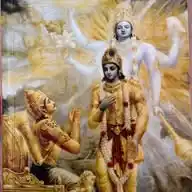
Bhagavadgita
95 subscribers
About Bhagavadgita
I will be posting every day from topics in the Bhagavadgita based on the lectures of Swamiji Paramarthananda. V. Hari Narayanan
Similar Channels
Swipe to see more
Posts

13 June 2025 Gita 13.28 reveals a profound truth: the wise see the same eternal essence in every being—the changeless within the changing. Just as one sun shines on all, one Supreme dwells in all lives, regardless of appearance or actions. Why treat everyone with respect? Because behind every face, even those we dislike, shines the same light. Seeing this is not naïve—it is wisdom. It frees us from shallow judgments and awakens compassion rooted in truth. When we honor the divine in others, we begin to live with true clarity and purpose.

12 June 2025 Krishna reveals a profound truth: all life—whether moving or still—emerges from the union of body and consciousness. We often reduce living beings to biology, but behind every form is an invisible consciousness. The body is just the “field,” and the soul is the “knower” enlivening it. This verse (13.27) urges us to see beyond appearances. That ant on the floor, that tree in silence—they too carry the same spark. Life isn’t mechanical; it’s sacred. When we grasp this, reverence replaces indifference. The world stops being objects—and becomes presence.

Our understanding of ātma (our Self) has to grow through several stages. At first we believe that consciousness is within the body, identifying with the physical body as the primary source of one's individuality. Our next level of understanding is, the same consciousness that is in my body, is present in all other people & beings also. Then we understand that consciousness is not only within the body's; but is all pervading. Consciousness appears discreet because it is recognised only when it is manifest as life in living beings. That means everything is within consciousness. All things we experience are appearing upon consciousness. This understanding acknowledges that consciousness is not limited to individual beings but is the fundamental essence of the creation itself. AND THAT CONSCIOUSNESS I AM. The individual self is seen identical with all pervading Brahman.

14 June 2025 Verse 13.29 – Seeing the Same Divine in All When we witness a selfless act or gaze into a child’s eyes, we feel something sacred — a quiet knowing that the same presence lives in all. Krishna says the wise see this truth always: the Divine dwells equally in every being. This emotional insight changes everything. We no longer harm others or ourselves, because it feels wrong — like hurting something sacred.

10 June 2025 The Real Self is the Witness Both Purusha (consciousness) and Prakruthi (nature) are beginningless, yet utterly different—one sentient and unchanging, the other inert and ever-changing. Purusha merely illuminates; Prakruthi acts. When the Self falsely identifies with the body and mind, it imagines itself as the doer and suffers. This confusion is the root of samsaara. But the Jnaani knows that the Self is ever the same as Paramaathmaa, untouched by change. Realizing this truth brings liberation—not in some distant heaven, but here and now.

15 June 2025 Verse 13.30 – The Seer of Truth “He who sees that all actions are performed by nature, and the Self is not the doer—he truly sees.” (BG 13.30) Krishna urges us to discern between the body-mind complex (prakriti) and the Self (atman). Actions arise from nature’s interplay of qualities, not from the pure Self, which merely witnesses. The wise understand this and do not identify with doing. This detachment doesn’t lead to passivity but to clarity. By seeing oneself as the non-doer, one transcends ego, anxiety, and pride, acting freely and selflessly—aligned with the deeper rhythm of life.

18 June 2025 The Self (Ātma) is absolute—present in all beings, yet untouched by anything that occurs within them. Like space, which pervades everything yet remains untainted by what it contains, Ātma is both immanent and transcendent. It enlivens every body, illumines every experience, yet remains ever pure, unchanged, and unaffected. This is not a metaphor—it is the nature of reality. The Self is the silent, eternal witness, never entangled in the play of matter. Krishna’s analogy of space reveals the formless, all-pervading truth of Ātma—undeniably present, supremely free.

17 June 2025 Brahman is eternal and unchanging — It is never born, does not die, And lies completely beyond all material attributes and modifications. It is pure consciousness itself. Even when associated with a physical body, Brahman remains untouched and unaffected. The body may act, But Brahman does not act. The senses may experience, But Brahman does not enjoy or suffer. Brahman is both Akarta (non-doer) And Abhokta (non-enjoyer). The notions of doership and enjoyership Belong to samsāra — the realm of illusion And identification with the body-mind. Ātman, identical with Brahman, Is ever free from both.

11 June 2025 Gist of Bhagavad Gītā 13.25–26: These verses describe various ways in which seekers come to realize the Self. Some do so through meditation (dhyāna), others through intellectual inquiry (sāṅkhya yoga), others through selfless action (karma yoga), and still others by dedicated listening to scriptures from a teacher (śravaṇam). All sincere seekers, regardless of method, ultimately cross over mṛtyu (mortality), attaining Self-knowledge. Swami Paramarthananda clarifies that these are not four separate paths but stages within the single sadhana of jñāna yoga. He points out that confusion arises when these methods are seen as mutually exclusive alternatives. Instead, he aligns them with the structured Vedāntic progression: 1. Karma yoga – to purify the mind. 2. Upāsanā yoga – to prepare the mind for subtle knowledge. 3. Śravaṇam – systematic listening to the teachings from a guru. 4. Mananam – removing doubts through reflection. 5. Nididhyāsanam – assimilating and internalizing the knowledge. He draws particular attention to the verse’s closing statement—“śrutvānyebhya upāsate, te’pi chātitarantyeva mṛtyuṁ śrutiparāyaṇāḥ”—affirming that those who faithfully listen to the teaching cross over mortality. This, Swamiji explains, underscores the centrality of śravaṇam in Vedānta.

09 June 2025 Bhagavad Gita 13.24: Freedom Through Clarity He who knows the Self (Puruṣa) as distinct from Nature (Prakṛiti) and its qualities (guṇas) is never born again—no matter how he lives. This verse dissolves the myth that liberation demands renunciation or ritual. What truly frees us is not what we do, but what we understand. When we see that we are not the body or mind but the silent witness behind them, the cycle of rebirth ends. Even in worldly life, if this clarity is firm, bondage drops. Liberation is not an escape—it is insight into the real, here and now.











